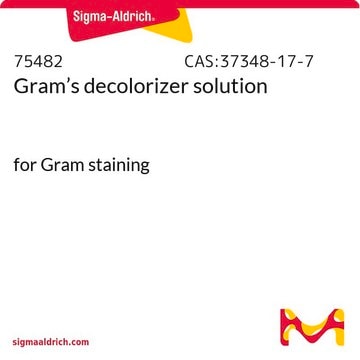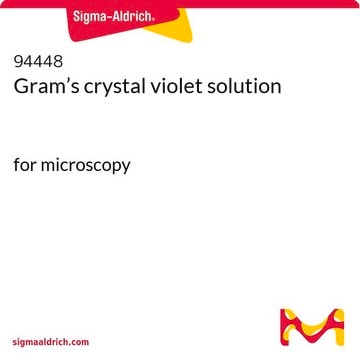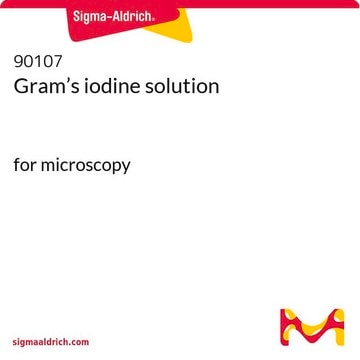94635
Gram′s safranin solution
for microscopy
Sinónimos:
Safranin T solution
About This Item
Productos recomendados
grade
for microscopy
Quality Level
form
liquid
shelf life
limited shelf life, expiry date on the label
composition
ethanol, 10%
technique(s)
microbe id | staining: suitable
color
red to very dark red
refractive index
n20/D 1.339
solubility
water: soluble at 20 °C
density
0.986 g/mL at 20 °C
εmax
4.0 at 532 nm in 50% ethanol
antibiotic activity spectrum
Gram-negative bacteria
Gram-positive bacteria
application(s)
diagnostic assay manufacturing
hematology
histology
storage temp.
room temp
SMILES string
[Cl-].Cc1cc2nc3cc(C)c(N)cc3[n+](-c4ccccc4)c2cc1N
InChI
1S/C20H18N4.ClH/c1-12-8-17-19(10-15(12)21)24(14-6-4-3-5-7-14)20-11-16(22)13(2)9-18(20)23-17;/h3-11H,1-2H3,(H3,21,22);1H
InChI key
OARRHUQTFTUEOS-UHFFFAOYSA-N
¿Está buscando productos similares? Visita Guía de comparación de productos
General description
Application
- as a non-toxic replacement for crystal violet for the quantification of biofilm formation
- to develop a hyaluronic acid visualization method
- to study improved β-lactam susceptibility against biofilm-embedded staphylococcus aureus by 2-aminothiazole
Features and Benefits
- Ready-to-use solution.
- Modified and designed in such a way that staining can be carried out in staining cells, on the staining rack, and in automated staining systems.
Principle
signalword
Warning
hcodes
Hazard Classifications
Flam. Liq. 3
Storage Class
3 - Flammable liquids
wgk_germany
WGK 2
flash_point_f
114.8 °F
flash_point_c
46 °C
ppe
Eyeshields, Faceshields, Gloves, type ABEK (EN14387) respirator filter
Elija entre una de las versiones más recientes:
¿Ya tiene este producto?
Encuentre la documentación para los productos que ha comprado recientemente en la Biblioteca de documentos.
Los clientes también vieron
Artículos
Clostridia are relatively large, gram-positive, rod-shaped bacteria that can undergo only anaerobic metabolism.
Clostridia are relatively large, gram-positive, rod-shaped bacteria that can undergo only anaerobic metabolism.
Clostridia are relatively large, gram-positive, rod-shaped bacteria that can undergo only anaerobic metabolism.
Clostridia are relatively large, gram-positive, rod-shaped bacteria that can undergo only anaerobic metabolism.
Nuestro equipo de científicos tiene experiencia en todas las áreas de investigación: Ciencias de la vida, Ciencia de los materiales, Síntesis química, Cromatografía, Analítica y muchas otras.
Póngase en contacto con el Servicio técnico










